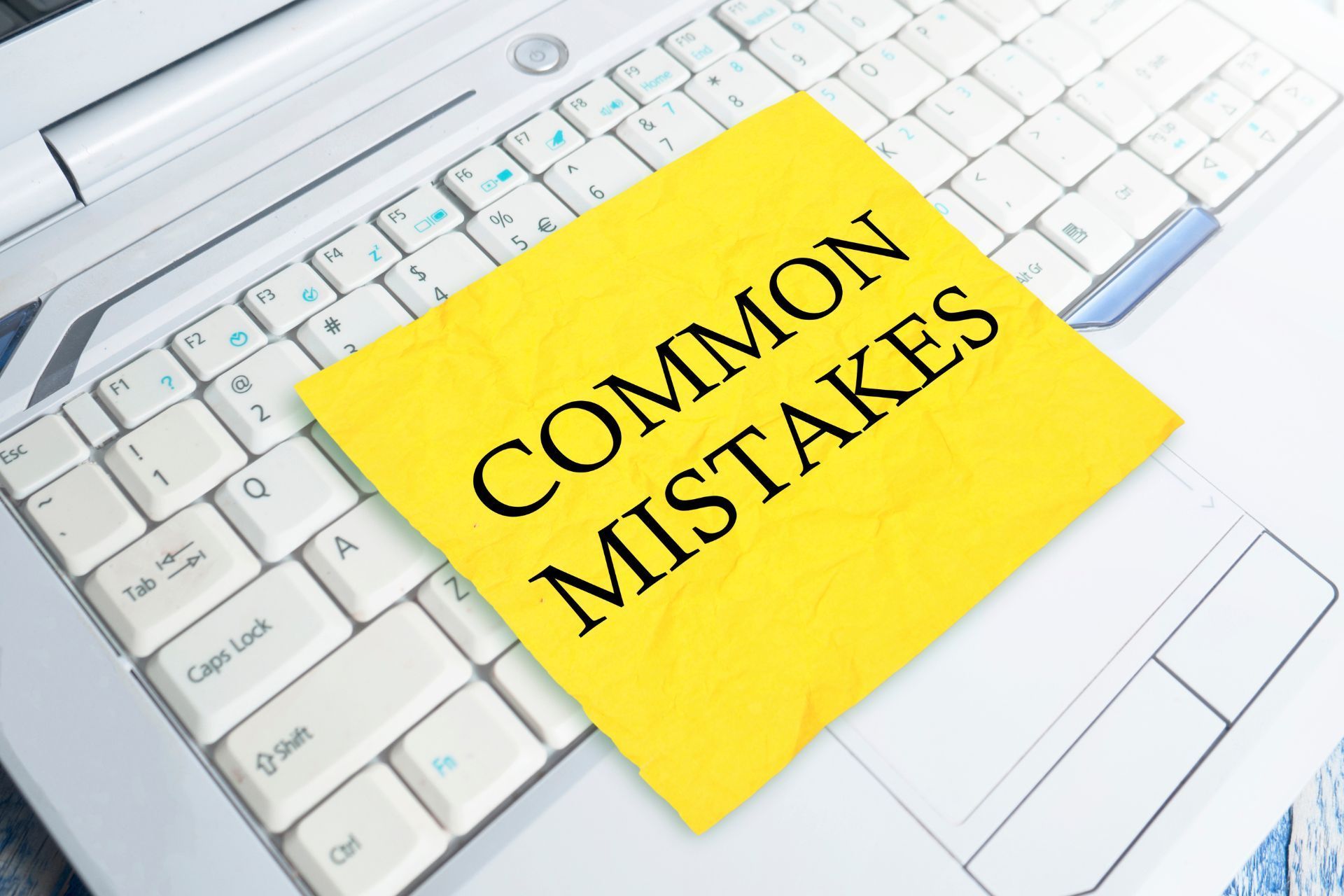Common SEO Mistakes to Avoid

Search Engine Optimization (SEO) is a critical component of any successful online marketing strategy. When done correctly, SEO can help drive organic traffic to your website and improve your search engine rankings. However, there are common mistakes that can hinder your SEO efforts and prevent your website from reaching its full potential.
In this blog post, we will discuss some of the most common SEO mistakes to avoid.
Keyword Stuffing
One of the most common SEO mistakes is keyword stuffing.The practice of keyword stuffing is considered a black hat SEO technique, as it goes against search engine guidelines and can result in penalties from search engines like Google. When a website is stuffed with keywords, it can make the content appear unnatural and unreadable to users, which ultimately leads to a poor user experience.
Search engines like Google are constantly evolving and updating their algorithms to combat tactics like keyword stuffing. They are now able to recognize when a page is over-optimized with keywords and will penalize the site by lowering its ranking in search results.
Instead of relying on keyword stuffing, website owners and SEO professionals should focus on creating high-quality, relevant content that is useful to their target audience. By incorporating keywords naturally into content and using them in a way that enhances the user experience, websites can improve their search rankings without resorting to spammy tactics.
Ignoring Meta Tags
Meta tags are an important part of a website's HTML code that provide information about the website's content to search engines. They include meta titles, meta descriptions, and meta keywords that help search engines understand what the webpage is about and rank it accordingly.
However, some website owners choose to ignore meta tags altogether, believing that they are not necessary for search engine optimization (SEO) or that they are too time-consuming to deal with. This can be a huge mistake, as meta tags play a crucial role in helping search engines understand and index website content.
Ignoring meta tags can result in lower search engine rankings and less visibility for your website. Search engines rely on meta tags to determine the relevance of a webpage to a user's search query, so if your meta tags are missing or not optimized properly, your website may not show up in search results at all.
Meta tags also play a role in improving click-through rates from search engine result pages (SERPs). A well-written meta description can entice users to click on your website, while a relevant meta title can help your website stand out among other search results. Ignoring meta tags means missing out on valuable opportunities to attract organic traffic to your website.
In addition, meta tags are also important for social media sharing. When a webpage is shared on social media platforms like Facebook or Twitter, the meta tags help to populate the preview information that users see. Without optimized meta tags, your website may not display as attractively or generate as much engagement on social media.
Poor Quality Content
Content is king when it comes to SEO. Poor quality or irrelevant content can negatively impact your website's search engine rankings. It's important to create high-quality, relevant content that provides value to your audience and helps improve your website's visibility in search results.
So, what exactly constitutes poor quality content? It can be anything from grammatical errors and typos to outdated information, lack of originality, and irrelevant or uninteresting topics. Whatever the form, poor quality content fails to resonate with your target audience and fails to deliver the intended message effectively.
One of the biggest pitfalls of poor quality content is the negative impact it can have on your brand's credibility. Consumers today expect high-quality, relevant, and valuable content from the brands they interact with. When they come across poorly written, inaccurate, or uninteresting content, it can have them questioning the professionalism and trustworthiness of your brand.
Another consequence of poor quality content is that it can harm your search engine rankings. Search engines like Google prioritize high-quality, relevant content in their search results. If your content is filled with errors, lacks value, or is irrelevant to your target keywords, it can push your website further down the search results, making it harder for consumers to find you online.
Furthermore, poor quality content can also lead to a lack of engagement and conversions. If your content fails to capture the attention of your target audience, they are less likely to engage with your brand, share your content, or take the desired action, whether it's making a purchase or signing up for a newsletter.
So, what can you do to avoid poor quality content and ensure that your brand's content strategy is effective and impactful? Here are a few tips:
- Set clear goals and objectives for your content: Before creating any piece of content, define what you want to achieve with it. Whether it's to educate, entertain, or drive conversions, having a clear goal will help you stay focused and ensure that your content serves its purpose.
- Invest in quality writing and editing: Grammar errors, typos, and poor writing can instantly turn off your audience. Invest in professional writers and editors to ensure that your content is error-free and engaging.
- Keep your content fresh and relevant: Stay up-to-date with the latest industry trends, news, and developments to ensure that your content remains relevant and valuable to your target audience.
- Use data and analytics to guide your content strategy: Monitor the performance of your content using analytics tools to identify what is resonating with your audience and what is not. Use this data to refine your content strategy and improve your content quality over time.
Neglecting Mobile Optimization
Mobile optimization refers to the process of ensuring that a website or online platform is user-friendly and easily accessible on mobile devices such as smartphones and tablets. With the increasing use of mobile devices for browsing the internet, neglecting mobile optimization can have detrimental effects on a business's online performance.
One of the main reasons why mobile optimization is important is because of the sheer number of people who use mobile devices to access the internet. According to recent studies, over 50% of internet traffic comes from mobile devices. This means that if a business's website is not optimized for mobile, it is likely missing out on a significant portion of potential customers.
In addition to reaching a larger audience, having a mobile-optimized site can also improve user experience. Mobile users have different expectations and behaviors compared to desktop users, and a website that is not optimized for mobile can lead to frustration and a high bounce rate. This can ultimately result in lost opportunities for conversions and sales.
Search engines like Google are now prioritizing mobile-friendly websites in their search results. This means that websites that are not optimized for mobile may not rank as highly in search engine results, making it harder for potential customers to find them.
Lack of Internal Linking
Internal linking is a crucial aspect of any website's SEO strategy, yet it is often overlooked or neglected. Many website owners focus on acquiring backlinks from external sources, but internal linking plays just as important a role in optimizing your site for search engines.
Internal linking refers to the practice of linking one page of a website to another within the same domain. This not only helps users navigate your site more easily, but it also helps search engines understand the structure of your website and the relationship between different pages.
However, many websites suffer from a lack of internal linking, which can have negative effects on their SEO performance. Without internal links, search engines may not be able to discover all of the content on your site, leading to lower visibility in search results.
Additionally, internal linking helps to distribute link equity throughout your site, boosting the authority of individual pages and improving their chances of ranking higher in search results. When pages are not internally linked, they may become isolated and lose out on the benefit of the collective authority of your website.
Furthermore, internal linking can improve the user experience on your site by guiding visitors to related content and encouraging them to explore further. This can increase engagement and reduce bounce rates, ultimately leading to a better overall user experience.
To improve your site's internal linking strategy, consider the following tips:
- Create a logical site structure: Organize your content in a way that makes sense and creates a hierarchy of pages. This will make it easier for users to navigate your site and for search engines to understand the relationship between different pages.
- Use descriptive anchor text: When linking between pages, use relevant and descriptive anchor text that gives users and search engines a clear idea of what to expect when they click on the link.
- Link to relevant pages: Only link to pages that are related to the content of the current page. This will help users find more information on topics they are interested in and will signal to search engines the relevance of your content.
- Consider site-wide elements: Utilize navigation menus, footer links, and sidebar widgets to strategically link to important pages throughout your site.
Lack of Regular Updates
When it comes to websites, blogs, and social media platforms, regular updates are crucial for staying relevant and engaging with your audience.
However, one common issue that many individuals and businesses face is the lack of regular updates. Whether it's due to lack of time, resources, or simply forgetting, not updating your website or social media accounts can have negative consequences.
One of the biggest downsides of not updating regularly is that your audience may lose interest. If they visit your website or social media page and see that the last update was months ago, they may assume you are no longer active or no longer care about engaging with your audience. This can result in a loss of followers, readers, and potential customers.
Additionally, not updating regularly can hurt your search engine rankings. Search engines like Google prioritize websites that are updated frequently with fresh content. If your website remains stagnant for extended periods of time, it can be pushed down in search results, making it harder for potential customers to find you.
Another downside of not updating regularly is that your content may become outdated or irrelevant. This can be particularly harmful if you are sharing information or promoting products or services that are no longer accurate or available. It can confuse your audience and damage your credibility.
So, how can you avoid the negative consequences of a lack of regular updates? Here are a few tips:
- Create a content calendar: Plan out your updates in advance and set aside time each week to work on content creation and scheduling.
- Delegate tasks: If you don't have the time or resources to update regularly, consider hiring a social media manager or content creator to help keep your online presence fresh.
- Set reminders: Use tools like calendar alerts or scheduling apps to remind you when it's time to update your website or social media accounts.
- Focus on quality over quantity: It's better to post less frequently but with high-quality, engaging content than to post frequently with mediocre content.
Overlooking technical SEO issues
While many marketers focus on creating high-quality content and building backlinks, they often overlook the importance of technical SEO issues. These issues can have a significant impact on a website’s visibility and overall performance in search engine rankings.
Technical SEO refers to the optimization of the website’s technical aspects to improve its visibility and performance in search engines. This includes factors such as site speed, mobile-friendliness, indexing, and crawling. Ignoring these technical aspects can hinder a website’s ability to rank well in search results, no matter how great the content is.
One common technical SEO issue that often gets overlooked is site speed. Slow-loading websites can have a negative impact on user experience, leading to high bounce rates and lower rankings in search results. It is crucial to regularly monitor and optimize website speed to ensure it loads quickly and efficiently for users.
Another overlooked technical SEO issue is mobile-friendliness. With the increasing use of mobile devices for browsing the web, it is essential for websites to be optimized for mobile users. Failure to do so can lead to a poor user experience and lower rankings in mobile search results.
Indexing and crawling are also important technical SEO issues that need to be addressed. Search engines need to be able to access and index a website’s content in order to display it in search results. Issues such as duplicate content, broken links, and improper meta tags can prevent search engines from properly crawling and indexing a website.






